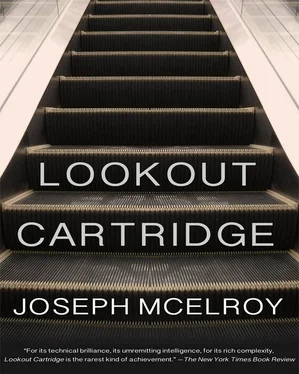Joseph McElroy - Lookout Cartridge
Здесь есть возможность читать онлайн «Joseph McElroy - Lookout Cartridge» весь текст электронной книги совершенно бесплатно (целиком полную версию без сокращений). В некоторых случаях можно слушать аудио, скачать через торрент в формате fb2 и присутствует краткое содержание. Год выпуска: 2014, ISBN: 2014, Издательство: Dzanc Books, Жанр: Современная проза, на английском языке. Описание произведения, (предисловие) а так же отзывы посетителей доступны на портале библиотеки ЛибКат.
- Название:Lookout Cartridge
- Автор:
- Издательство:Dzanc Books
- Жанр:
- Год:2014
- ISBN:9781941088036
- Рейтинг книги:3 / 5. Голосов: 1
-
Избранное:Добавить в избранное
- Отзывы:
-
Ваша оценка:
- 60
- 1
- 2
- 3
- 4
- 5
Lookout Cartridge: краткое содержание, описание и аннотация
Предлагаем к чтению аннотацию, описание, краткое содержание или предисловие (зависит от того, что написал сам автор книги «Lookout Cartridge»). Если вы не нашли необходимую информацию о книге — напишите в комментариях, мы постараемся отыскать её.
Lookout Cartridge — читать онлайн бесплатно полную книгу (весь текст) целиком
Ниже представлен текст книги, разбитый по страницам. Система сохранения места последней прочитанной страницы, позволяет с удобством читать онлайн бесплатно книгу «Lookout Cartridge», без необходимости каждый раз заново искать на чём Вы остановились. Поставьте закладку, и сможете в любой момент перейти на страницу, на которой закончили чтение.
Интервал:
Закладка:
Even with inflation the life most of us had here was good. You didn’t need our umpire’s great blocks of Telephone stock, Corning Glass, or Standard of New Jersey. You didn’t have to send your children to expensive schools and commute twice a week to your American firm’s new offices in Geneva. You didn’t have to play poker Friday nights with some smart Fleet Street bachelors, or drink at the French pub in Soho with a relative of Freud’s, and you didn’t have to be a poet from Kentucky living off a BBC actress. You didn’t have to do what I did, or what Dagger did, or like the right-fielder on the side opposing Cosmo’s, sit under the British Museum Reading Room’s cloudy skylight (or in the warmer North Library when the age or rarity of the book required, though as Savvy Van Ghent’s researches claimed, the quality of the girls was not so high) week after week studying the elusive artist-engineer Catherwood till you almost thought you were Catherwood.
No, you might enjoy decent obscurity in your neighborhood watching the postal service decline, your English friend Millan’s work get bigger, BBC TV show movies without the interruption of commercials, the London air get cleaner but hold in its smell the same stony tonic that came into the house the first year when Lorna’s char at five bob an hour threw open all the windows in any weather. You take the wife to the theater and in the lobby at intermission hear an American explain that this is Shakespeare’s only real-time play in which fictive time almost equals our time, Prospero’s alchemical time almost equals the time we spend watching. You come to know Millan’s friends, and their friends; but after a bad period in the fifties Lorna has made some friends of her own and you begin to move around, begin to make these carefully aimed returns to the States; you get a second London like some second wind, and instead of going home to America on the evening brink of J. F. Dulles’s death and its advance lamentations, you stay: you get off the red double-decker two steps early and cut through a park always unexpectedly large and secret and sloping: you answer your parents’ letters, for this is long before your mother on one of her visits brings a cassette recorder so you and Lorna and especially Jenny and Billy (with their accents that have a Cockney force their grandparents can’t hear) can send cassettes instead of ah letters — Billy at the word-game stage. You read the American news in the Guardian . One night years later you and your closest American friend cook up a film sort of: you’ve begun to think about London and England again, but you are comfortable, you live here in one way or another; but the altercation that now stops the Sunday softball game and draws the players in around the pitching rubber seems outlandishly to come from your own fear here in the third inning that there is something wrong about the film you and Dagger DiGorro are beginning; Dagger’s camera is singing its gnatlike note at the Connecticut actor who’s now standing on second and pounding his glove; Jenny’s nowhere in sight, and the actor, as Cosmo raises his voice to the batter who has approached him from home plate and whose name eludes me as I watch the actor, moves idly around the disputants and keeps going and crosses the imaginary third-base line and without telling anyone walks away from the weekly American softball game. Dagger has unscrewed the camera base from the tripod, and now like my own head wandering from what we were there for that Sunday into the issue of whether or not the motorbike that brought Jenny home at 3 A.M. was the Connecticut guerrilla-theater actor, who indeed rides a motorbike, Dagger seems to let the man crossing behind the group at the pitching rubber draw his focus off over the third-base line into foul territory, which for the Connecticut actor is no longer even that, for he’s stepped out of the game. When I murmur in Dagger’s ear, Hey I wonder where that guy thinks he’s going, Dagger takes his finger off the thumb button at the top of the pistol grip, hands me the Beaulieu, and heads for the pitching rubber where Cosmo is loudly claiming the batter was crowding the plate, and as the batter lowers his voice to a new intensity his left hand which has never dropped the bat tightens and through the midst of the group the blond bat with its meat end resting on the English grass seems a sinister and potential pole the mere people there depend on.
That Sunday night I wrote an account of that first filming and though that first scene the softball game was silent I included Dagger’s words and Cosmo’s and Will’s but could not recall the batter’s name, and having faithfully recorded the filmed origin of the dispute about Cosmo’s low and inside smokeball, I found in the corner of my eye the Connecticut actor, a slight figure in tie-dyed jeans, passing behind the others at the center of the diamond, then emerging alone, strolling on and on as if the softball game were in another time, ambling off toward a pedestrian path and looking beyond it distinctly at something, though what I couldn’t tell. There was a woman maybe fifty yards beyond the walk and she seemed shadowed by the tree she leaned against and at that instant Dagger called to me not to go crazy now — for I’d raised the Beaulieu just to follow the guerrilla actor through the viewfinder for the hell of it — thinking what prospects a boy like that could have acting antiwar skits on street corners in Battersea with an undergraduate group from Oxford — and I lowered the camera and the thought of Jenny sobered me too much so I called back Christ I’m not shooting! — I had suddenly registered that the woman off by the tree was indeed what the guerrilla-theater actor was aiming for; but Dagger’s jibe was itself now interrupted by new words between Cosmo and the batter he’d dusted with his fastball. But now it wasn’t You fat blowfish, where’d you learn to play ball, the only way you going to get me out is keep me ten feet away from the plate, and chawing tobacco out there won’t help—
Nor Cosmo’s ordinary noise: You so close to the plate I got to pitch behind you to get it over, take the shades off, man, you’ll see better.
It was something else now, a new ball game they were speaking to each other: Got nothing better to do than hang around the park, the batter said, and I registered his words but still at that moment not exactly him, for way off to my left, though I wasn’t exactly looking at them, the guerrilla-theater actor was moving with a glow around him toward the woman at the tree. And then Cosmo, holding the white softball up so you could see the black seams and turning it this way and that the way he always did before his whirlwind double-three-hundred-sixty-degree windup, all of which Dagger had caught in the second or third minute of shooting, but now no windup, just the turning of the ball up near Cosmo’s jaw, a sort of screwing toward his new words, Cosmo said, Listen I did my time back home, man, my number came up, I quit the collegiate power structure and I did my two years in the army, man, and I been here long enough to know a free-loader when I see one so don’t shit me, man, you don’t like it here go back to Copenhagen, those sixteen-year-olds you been picking up.
The woman turned as if to stand behind the tree, but I think she was moving off ahead of the actor, but what happened now made it hard to follow her out of the shadow of the tree, for the batter — the same one Dagger had shot his first time up the first inning, big orange and silver and cherry-colored rings on his fingers, his body wiggling up and down trying — and successfully then — to get a walk off Cosmo — came right back at Cosmo now: Cosmo, a vet like you is just another poor pig, you’re a veteran of like Fort Dix, you never got to California much less Vietnam, and you’re over here because it’s a soft touch — the batter increasingly nameless the more I reached directly for his name, lifted his bat and there was Dagger taking it with both hands.
Читать дальшеИнтервал:
Закладка:
Похожие книги на «Lookout Cartridge»
Представляем Вашему вниманию похожие книги на «Lookout Cartridge» списком для выбора. Мы отобрали схожую по названию и смыслу литературу в надежде предоставить читателям больше вариантов отыскать новые, интересные, ещё непрочитанные произведения.
Обсуждение, отзывы о книге «Lookout Cartridge» и просто собственные мнения читателей. Оставьте ваши комментарии, напишите, что Вы думаете о произведении, его смысле или главных героях. Укажите что конкретно понравилось, а что нет, и почему Вы так считаете.












